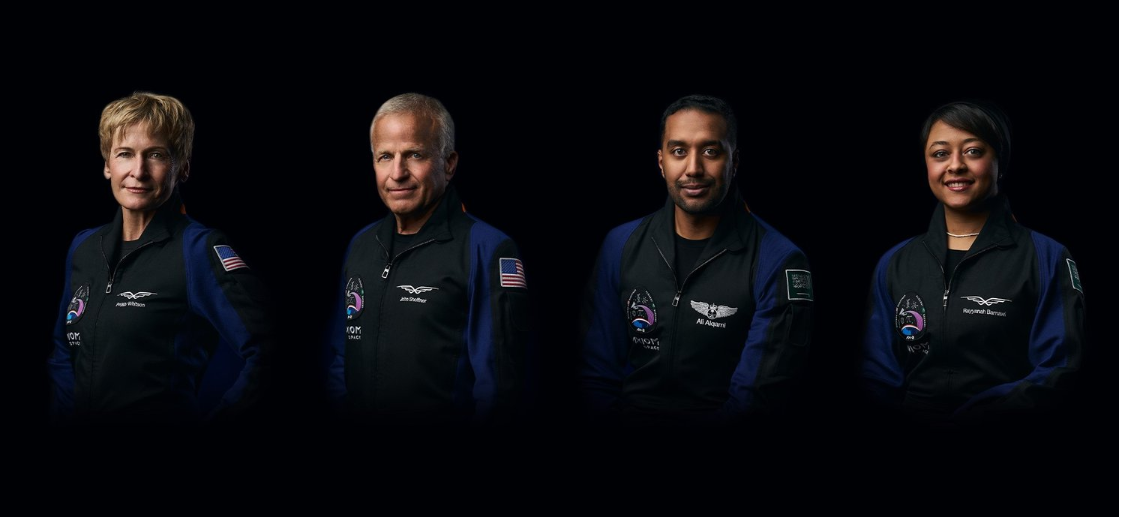
Left to right, Cmdr. Peggy Whitson, pilot John Shoffner and Saudi Arabian Mission Specialists Ali Alqarni and Rayyanah Barnawi.
HOUSTON—Preparations for Axiom Space’s second four-person private astronaut mission to the International Space Station (ISS) cleared its May 15 flight readiness review and remains on track for a liftoff early next week from NASA’s Kennedy Space Center.
Launch is scheduled for May 21 at 5:37 p.m. EDT, to set up an automated docking with the station’s U.S. Harmony module on May 22 at about 9:30 a.m. EDT.
The SpaceX Falcon 9 launch with the Crew Dragon capsule is to deliver Houston-based Axiom Space’s Peggy Whitson, the retired veteran NASA astronaut who will serve as commander, pilot John Shoffner, Saudi Arabian astronauts Ali Alqarni and Rayyanah Barnawi, as well as a payload of more than 20 science experiments for an eight day stay.
“Today, we had a review where we brought together members of the team from Axiom Space, SpaceX and NASA to talk about the upcoming mission and at the end of that review the full team polled ‘go’,” NASA’s Ken Bowersox, associate administrator of the agency’s Space Mission Operations Directorate, told a post-review news briefing.
“These missions are very important to us at NASA as we try to open up low Earth orbit, especially to a greater cross section of society,” Bowersox elaborated. “There is a lot to be done there, and we think the economy in low Earth orbit will continue to expand. Someday NASA will just be a participant in that economy, buying services from private industry in low Earth orbit as NASA goes out and explores on the cutting edge.”
The planned 10-day mission is a follow up to AX-1, Axiom Space’s 17-day first private astronaut mission to the ISS in April 2022. The third Axiom Space private astronaut mission to the ISS is planned for no earlier than November 2023 and will include a possible 14-day stay at the orbital lab.
Initial plans for a 12-day AX-2 mission, including 10 days at the ISS, have been scaled back because of a busy schedule of activities aboard the seven-person station, according to Joel Montalbano, NASA’s ISS program manager, who participated in the news briefing. Among those are plans for the June 3 launch of the 28th NASA-contracted SpaceX Cargo Dragon ISS resupply mission.
The Dragon cargo capsule is to include a final pair of ISS Roll Out Solar Arrays (iROSAs) that are part of an overall upgrade to the ISS solar power system that is to include six arrays. The first two pairs of iROSAs were installed with spacewalks in June 2021 and December 2022 and NASA would like to complete the installation of the last two iROSAs by the end of June.
If the AX-2 launch is delayed beyond May 22, NASA and Axiom Space will assess the schedule prior to establishing a new target launch date, according to Montalbano.
The AX-1 mission provided lessons learned in terms of crew training as well as on-orbit operations, according to representatives from both NASA and Axiom Space.
Axiom Space is pursuing a goal of conducting two private astronaut missions to the ISS annually as it prepares to begin the assembly of Axiom Station, a multi module, free-flying commercial station. The first Axiom Station modules are to be assembled at the U.S. segment of the ISS beginning in 2025 and be prepared to separate for independent flight prior to the planned end of ISS operations in 2030.
The transition is a response to NASA’s emerging human deep-space exploration push to establish a sustained human presence at the Moon and prepare for human expeditions to Mars.
A $140 million, potentially seven-year contract NASA entered into with Axiom Space in January 2020 to develop a commercial successor to the ISS was followed by agreements between NASA and teams led by Blue Origin, Nanoracks and Northrop Grumman in December 2021 to develop additional low Earth orbit commercial destinations to support scientific research and technology development.
